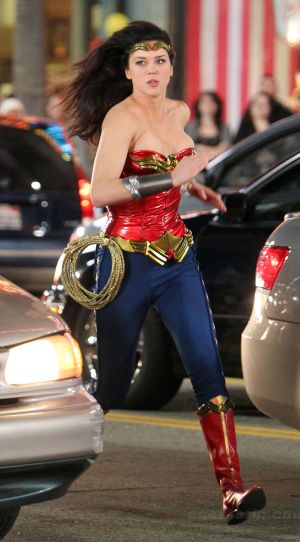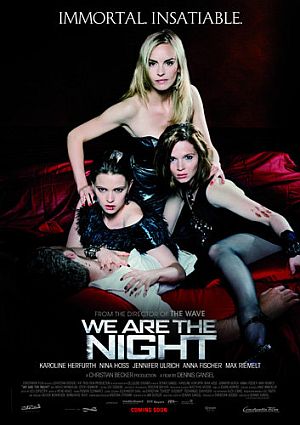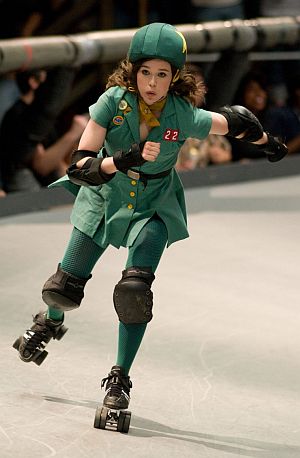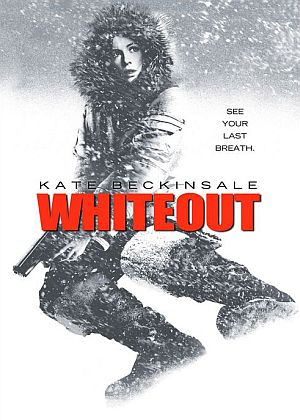★½
“As dead as the ancient Britons.”
 In the late seventies, British television was notable for series which generally kicked ass on the performance front, but suffered from woefully inadequate production values. The most well-known example is Doctor Who, but that was just the tip of a dramatic iceberg which included the likes of Blake’s 7 and this series: in some cases, you can look past or ignore the deficiencies, because the acting is good enough to counteract them. That, sadly, isn’t the case here, with Phillips (a compatriot of Diana Rigg and Glenda Jackson at RADA) sadly adrift as Boudicca, the queen of the Iceni who takes on the occupying Roman forces after her daughters are assaulted. Having enjoyed the 2003 version, with Alex Kingston in the title role, I thought I’d give this one a chance, but when a supposed army of 6,000 is represented by four chariots and, maybe, ten guys in animal skins, it’s hard not to notice.
In the late seventies, British television was notable for series which generally kicked ass on the performance front, but suffered from woefully inadequate production values. The most well-known example is Doctor Who, but that was just the tip of a dramatic iceberg which included the likes of Blake’s 7 and this series: in some cases, you can look past or ignore the deficiencies, because the acting is good enough to counteract them. That, sadly, isn’t the case here, with Phillips (a compatriot of Diana Rigg and Glenda Jackson at RADA) sadly adrift as Boudicca, the queen of the Iceni who takes on the occupying Roman forces after her daughters are assaulted. Having enjoyed the 2003 version, with Alex Kingston in the title role, I thought I’d give this one a chance, but when a supposed army of 6,000 is represented by four chariots and, maybe, ten guys in animal skins, it’s hard not to notice.
Phillips is fine as the queen, possessing a certain royal gravitas that’s fitting. But the “warrior” part of the equation is all but neglected, with her fight against another tribe’s chief, to prove herself capable of leading the revolt, among the least-convincing in television history. She is also burdened with two daughters who appear largely to have strayed in from a family sit-com of the era, and Gothard as a loony Druid priest, perpetually burbling about “angering the Gods.” Perhaps the only other decent performance is Hawthorne as the Roman bureaucrat who is the trigger for, and the first to face, Boudicca’s wrath. He would go on to comedic stardom, playing Sir Humphrey Appleby in Yes, Minister, though is best known worldwide as Dr. Cocteau in Demolition Man, and brings much the same combination of world-weariness and snooty arrogance to this role.
However, the absolute poverty-row level of costumes, sets and (in particular) the battle scenes are easily what will leave the most lasting impression, and I don’t mean that in a good way: it’s hard to say how it might ever have past muster, even in the days of a less-sophisticated viewing audience (I was 12, and certainly less-sophisticated!). The net result is that this has all the impact of something made on the cheap for showing to schools, and given the trouble I had retaining consciousness, would likely not have enlivened even the dullest of history lessons.
Dir: Michael Custance and Neville Green
Star: Sian Phillips, Michael Gothard, Patti Love, Nigel Hawthorne





 Allowing for the fact this was more or less a rough-cut – you can still see the wires as the heroine throws villains around – this actually is far from the atrocity you expect, going from the pre-production fan loathing. The story avoid the whole “origins” thing, hitting the ground running by having Wonder Woman/Diana Prince (Palicki) already fully-active, and busting crime around Los Angeles. Her extra-legal activities, with the local cops’ complicity, bring her to the attention of the federal authorities. Meanwhile, she’s tussling with the board of her company over the merchandise that funds her crime-fighting, objecting to the size of the tits on her action-figure – and, yes, they actually say “tits”, to my surprise. Finally, the villainess (Hurley) is performing illegal medical experiments with steroids and such, to create super-soldiers, and it’s up to Wonder Woman, her plane (wisely, no longer invisible), bullet-deflecting bracelets and lasso which may or may not be of truth (it’s unclear from this episode) to stop her.
Allowing for the fact this was more or less a rough-cut – you can still see the wires as the heroine throws villains around – this actually is far from the atrocity you expect, going from the pre-production fan loathing. The story avoid the whole “origins” thing, hitting the ground running by having Wonder Woman/Diana Prince (Palicki) already fully-active, and busting crime around Los Angeles. Her extra-legal activities, with the local cops’ complicity, bring her to the attention of the federal authorities. Meanwhile, she’s tussling with the board of her company over the merchandise that funds her crime-fighting, objecting to the size of the tits on her action-figure – and, yes, they actually say “tits”, to my surprise. Finally, the villainess (Hurley) is performing illegal medical experiments with steroids and such, to create super-soldiers, and it’s up to Wonder Woman, her plane (wisely, no longer invisible), bullet-deflecting bracelets and lasso which may or may not be of truth (it’s unclear from this episode) to stop her. Probably best to approach this with few expectations of this being a factual representation of the time; more than once, it felt clearly like the writer was using the Roman occupation of Britain, and Boudica’s rebellion, as a metaphor for American’s involvement in Iraq. There are certainly enough anachronisms, particularly in the dialogue (the Roman Emperor chatting informally away with the leader of a British tribe, and references to “terrorists”), that it seems deliberate. The basic story is the one well-known of legend: after her husband’s death, and the raping of her daughters by the invading Romans, Boudica (Kingston) led her tribe in an initially successful revolt, only to be stopped when the full force of the Empire was turned on them.
Probably best to approach this with few expectations of this being a factual representation of the time; more than once, it felt clearly like the writer was using the Roman occupation of Britain, and Boudica’s rebellion, as a metaphor for American’s involvement in Iraq. There are certainly enough anachronisms, particularly in the dialogue (the Roman Emperor chatting informally away with the leader of a British tribe, and references to “terrorists”), that it seems deliberate. The basic story is the one well-known of legend: after her husband’s death, and the raping of her daughters by the invading Romans, Boudica (Kingston) led her tribe in an initially successful revolt, only to be stopped when the full force of the Empire was turned on them. Nami is sent to jail for killing a Yakuza boss, and when she is released, returns to the Ginza district of Tokyo to live with her uncle, who runs a pool hall. She gets a job as a hostess in a bar, with the help of her new friend Ryuji (Watase), but the quiet life doesn’t last for long, even as she tries to help the widow of the man she killed – whose petition on behalf of Nami is what helped lead to her early release. For the local mob, in the shape of Okada (Nanbara) and his gang, are sniffing around the bar, seeking to take it over. To settle things, Nami offers to take on Okada’s champion at billiards, a challenge the gangster readily accepts, not realizing he has just been hustled, and that Nami is no mean player herself. Can she win – and even if she does, will Okada live up to his side of the bet?
Nami is sent to jail for killing a Yakuza boss, and when she is released, returns to the Ginza district of Tokyo to live with her uncle, who runs a pool hall. She gets a job as a hostess in a bar, with the help of her new friend Ryuji (Watase), but the quiet life doesn’t last for long, even as she tries to help the widow of the man she killed – whose petition on behalf of Nami is what helped lead to her early release. For the local mob, in the shape of Okada (Nanbara) and his gang, are sniffing around the bar, seeking to take it over. To settle things, Nami offers to take on Okada’s champion at billiards, a challenge the gangster readily accepts, not realizing he has just been hustled, and that Nami is no mean player herself. Can she win – and even if she does, will Okada live up to his side of the bet? I find the line between “terrorist” and “freedom fighter” an interesting one, drawn not so much by any objective measure, but by the viewer’s perspective and historical hindsight. Qiu Jin is a good example: she fought against the perceived oppression – particularly of women – by the Qing dynasty in the early 20th century, and ended up getting publicly beheaded for her support of revolutionary factions, by the government of the time. Now? A heroine and a martyr, who has an official museum ‘n’ stuff. Funny how things work out.
I find the line between “terrorist” and “freedom fighter” an interesting one, drawn not so much by any objective measure, but by the viewer’s perspective and historical hindsight. Qiu Jin is a good example: she fought against the perceived oppression – particularly of women – by the Qing dynasty in the early 20th century, and ended up getting publicly beheaded for her support of revolutionary factions, by the government of the time. Now? A heroine and a martyr, who has an official museum ‘n’ stuff. Funny how things work out. There aren’t many times I agree with censorship, but the British Board of Film Classification rejected this movie entirely when it was submitted in 1987. I’d like to thank them for saving the public from this appalling piece of dreck for 25 years, even if I think they were probably confusing it with Abel Ferrara’s Ms. 45, which was also known as Angel of Vengeance in the UK. I can’t believe they actually
There aren’t many times I agree with censorship, but the British Board of Film Classification rejected this movie entirely when it was submitted in 1987. I’d like to thank them for saving the public from this appalling piece of dreck for 25 years, even if I think they were probably confusing it with Abel Ferrara’s Ms. 45, which was also known as Angel of Vengeance in the UK. I can’t believe they actually  And winner of ‘Least Accurate Movie Tag-line of 2011’ goes to this one, by a country mile. “Sucker Punch on steroids”? Well, let me tell you something. I know Sucker Punch. And Warriors, you’re no Sucker Punch. The drugs reference is fitting, though I’m thinking less steroids, and more likely an overdose of Vicodin. Everything about this, from martial-arts fights staged at the speed of a reluctant glacier, through lighting of scenes that’s so poor as often to be non-existent and obvious digital gunfire [as seen in an extended scrap-yard gun-battle, without any glass being shattered at all], to a painful, sludgecore metal soundtrack presumably made by some mate of the producers, combine into a deeply uninteresting viewing experience.
And winner of ‘Least Accurate Movie Tag-line of 2011’ goes to this one, by a country mile. “Sucker Punch on steroids”? Well, let me tell you something. I know Sucker Punch. And Warriors, you’re no Sucker Punch. The drugs reference is fitting, though I’m thinking less steroids, and more likely an overdose of Vicodin. Everything about this, from martial-arts fights staged at the speed of a reluctant glacier, through lighting of scenes that’s so poor as often to be non-existent and obvious digital gunfire [as seen in an extended scrap-yard gun-battle, without any glass being shattered at all], to a painful, sludgecore metal soundtrack presumably made by some mate of the producers, combine into a deeply uninteresting viewing experience.
 Lena (Herfurth) lives on the edge of society: stealing from other criminals, and running from the cops. But her life changes forever, when she comes to the attentions of Louise (Hoss), a rich socialite, who runs with her pack of friends. Louise is actually a centuries-old vampire, who sees something in Lena’s eyes, something for which Louise has been searching for many decades. She bites Lena, and her transformation into a creature of the night begins. It’s not without its issues: to force Lena to come to terms with her new-found strength and speed, she is handed over to a pimp, a scenario which turns into a blood-bath. While Lena does adapt, the police investigate the killings and Tom (Riemelt), who knew Lena from her street days, realizes there’s a connection between her and what happened.
Lena (Herfurth) lives on the edge of society: stealing from other criminals, and running from the cops. But her life changes forever, when she comes to the attentions of Louise (Hoss), a rich socialite, who runs with her pack of friends. Louise is actually a centuries-old vampire, who sees something in Lena’s eyes, something for which Louise has been searching for many decades. She bites Lena, and her transformation into a creature of the night begins. It’s not without its issues: to force Lena to come to terms with her new-found strength and speed, she is handed over to a pimp, a scenario which turns into a blood-bath. While Lena does adapt, the police investigate the killings and Tom (Riemelt), who knew Lena from her street days, realizes there’s a connection between her and what happened. Bliss Cavendar (Page) is stuck in the hickville of Bodeen, Texas: her mother (Harden) coerces her into small-town beauty pagents, but Bliss’s heart isn’t in it. On a shopping trip to Austin, she picks up a roller-derby flyer, and on attending the event with her friend Pash (Shawkat), falls in love with the sport and decides to try out. She has to lie about her age to do so, and also keep her attendance a secret from her parents. Bliss has a natural talent, and helps her team, the Hurl Scouts, previously the doormats of the league, to the championship game against the Holy Rollers, under Iron Maven (Lewis). The confidence Bliss gains is not without its issues however, bringing her in to conflict with her boyfriend and Pash, as well as her parents…
Bliss Cavendar (Page) is stuck in the hickville of Bodeen, Texas: her mother (Harden) coerces her into small-town beauty pagents, but Bliss’s heart isn’t in it. On a shopping trip to Austin, she picks up a roller-derby flyer, and on attending the event with her friend Pash (Shawkat), falls in love with the sport and decides to try out. She has to lie about her age to do so, and also keep her attendance a secret from her parents. Bliss has a natural talent, and helps her team, the Hurl Scouts, previously the doormats of the league, to the championship game against the Holy Rollers, under Iron Maven (Lewis). The confidence Bliss gains is not without its issues however, bringing her in to conflict with her boyfriend and Pash, as well as her parents… “Oh, look,” I said to Chris. “Whiteout is just starting. It’s about a US marshal investigating a murder in Antarctica. Let’s take a look, shall we?” And, of course, the first thing we see is Kate Beckinsale bending over in her underwear, as she undresses to take a shower. I haven’t heard her eyes whirring as they rolled in her skull like that, probably since the first 20 minutes of Bitch Slap. I’ll have to sit through a few Ghost Whisperer episodes to make up for that. God forbid, maybe even stay awake for one. The sad news is, that was probably the most memorable moment in a film which, on balance, is marginally less interesting than the weather phenomena name-checked in the title.
“Oh, look,” I said to Chris. “Whiteout is just starting. It’s about a US marshal investigating a murder in Antarctica. Let’s take a look, shall we?” And, of course, the first thing we see is Kate Beckinsale bending over in her underwear, as she undresses to take a shower. I haven’t heard her eyes whirring as they rolled in her skull like that, probably since the first 20 minutes of Bitch Slap. I’ll have to sit through a few Ghost Whisperer episodes to make up for that. God forbid, maybe even stay awake for one. The sad news is, that was probably the most memorable moment in a film which, on balance, is marginally less interesting than the weather phenomena name-checked in the title.